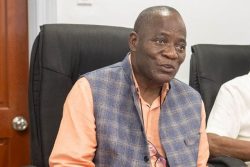Anyone who has wrestled with the fiction of Wilson Harris could be forgiven for wondering whether his services to literature really merit a knighthood. Dense, dreamlike and headscratchingly unorthodox in their treatment of time, place and character, Harris’ novels have baffled two generations of readers and will certainly perplex several more. Whatever your opinion of other Guyanese authors whose fame has spread beyond the Caribbean – Carew, Carter, Heath, Mittelholzer, Seymour and Williams to name the most obvious – at least they can be understood. For most of us, however, Harris remains as mysterious on a twentieth reading as he was on the first, his visionary worlds as impenetrable to the average Guyanese as late Joyce was to Irishmen.
This impression is understandable, but mistaken. Harris’ work is not likely to become any easier to read, but a half-century of exegesis, by patient devotees, has shown that not only are his obscurities justifiable, they are practically inevitable given what he was trying to convey. Most writers who came of age near the end of the colonial era attempted to describe the society they had grown up in; Harris, almost uniquely, grasped the need for something more.
Deeply influenced by the ‘mythic method’ of high modernists like Eliot and Joyce, Harris set out to redescribe his society sub specie eternitatis – through the lens of an historical consciousness which reached back several centuries and encompassed the racial memories of Europe, Africa and the Americas. The conventions of traditional fiction, which tended to dwell on the surfaces of things, simply could not do this. So Harris forged a style that let him delve into the interior life of a country that was both ancient – if seen as part of the continental land mass – and, paradoxically, in its political infancy as it emerged from the clutches of its colonial master. Eager to restore the lost perspectives of a landscape he had mapped as a professional surveyor, he had the intellectual courage, and chutzpah, to fictionalize his visionary intuitions without yielding to the lure of simplification.
Prodigiously well read, and dauntingly familiar with Marxist and Existentialist thought, Harris referred unblushingly to Heideggerian dasein and geworfenheit, and to ‘absent presences’ in the national soul. Far from being pretentious or obscurantist, these concepts translated the struggle of the West Indian artist into language that could be understood on a world stage. CLR James and Derek Walcott held similarly panoptic views of European culture, and they also possessed the intellectual confidence to respond to it on their own terms. In fact, his novels and cultural criticism fit squarely into a literary vision of the Caribbean shared by both of these men, and in some instances he even seems to have helped pave the way for their success.
Harris’ advances into the terra incognita of postcolonial literature are impressive in their own right, but they seem positively heroic when you consider the doubts of the early years of independence. It is possible to get some sense of our insecurities from a wonderful short survey of Guyanese literature which AJ Seymour published in 1978. The introduction to The Making of Guyanese Literature, cites an anonymous Canadian who observed that “Colonialism is a spirit that gratefully accepts a place of subordination, that looks elsewhere for its standards of excellence… one of the most damaging of the results of colonialism is the feeling of inferiority and doubt it engenders… The colonial attitude of mind sets the great good place not in its own future but somewhere outside its own borders, somewhere beyond its possibilities.” A little further on, Seymour warns us that “Guyana has 800,000 people, a figure well below the critical mass of population necessary for greatness, in the Aristotelian or in any other sense, and it is only when its writings, as well as its population, are added to those of the West Indian partners that one has there the beginnings of a national literature.” Harris appreciated these limitations from the start of his career, and he went on to transcend them with great tenacity and extraordinary imaginative force. And although he endured several quiet decades before receiving the attention he deserves, his confidence and creative stamina have never failed.
The ambitions of Harris’ generation now seem remote from our diminished cultural expectations. His contemporaries knew the Western Canon and rewrote parts of it to suit their own purposes; they loved Milton, Shakespeare and the Romantics and learned from moderns as diverse as Auden and Akhmatova. But this curiosity was hardly a product of cultural elitism; to them it felt like a natural consequence of a good education. At one point AJ Seymour tells us that “Sometimes the judgment was stated that the English of the school masters in Guyana in the early 20th century qualified for the term Johnsonese after the style of the great Samuel Johnson, redolent of rolling periods and rhythms and salty with a quick wit, but there was a great love of language and an infectious sense of its mastery.” The culture which shaped that sentence, and its author – a culture of gentle self-deprecation and erudition lightly worn – has all but died out in Guyana, and the prospects for its return are, to say the least, not encouraging.
Seymour had few illusions that it would be easy to maintain these high standards in an independent Guyana. After praising the quality of our secondary education then, he admitted: “This era is, I believe, passing. One sees a certain declension in the quality of teaching that must be regretted and deplored, classes are larger, teachers seem less able… It may be also that the classics of the English language are not being read and studied in quite the same way as the past… [which has contributed to a] levelling mediocrity, which will affect the expression of the creative imagination.” Thirty years on those words seem depressingly prophetic.
Wilson Harris’ knighthood may well be the last hurrah for truly groundbreaking West Indian literature, at least the portion to which Guyana can lay claim. As we celebrate his belated recognition we should also remember how much we have lost over the years. Five decades ago this country – and the region – seethed with charismatic, sophisticated, politically engaged artists and literary figures, many of them self-taught. Independence was meant to produce more of this, and to help us emerge from the shadows of empire. Writers like Harris tried to show us a way to move beyond our mental prisons and political muddles. But they were largely ignored. Today, more than ever, we need a comparable group of writers and artists to illuminate our condition. But where are they to be found?








